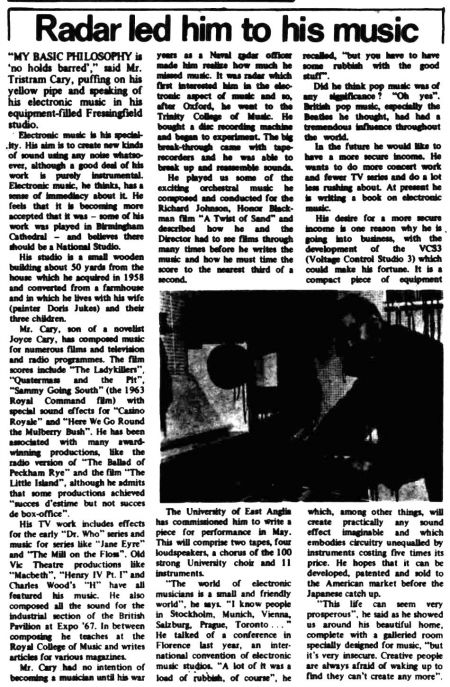Radar led him to his music
- Publication: Norfolk and Suffolk Journal
- Date: 1970-01-16
- Author:
- Page: 8
- Language: English
"MY BASIC PHILOSOPHY is 'no holds barred'," said Mr. Tristram Cary, puffing on his yellow pipe and speaking of his electronic music in his equipment-Mod Fressingfield studio.
Electronic music is his specialty. His aim is to create new kinds of sound using any noise whatever, although a good deal of his work is purely instrumental. Electronic music, he thinks, has a sense of immediacy about it. He feels that it is becoming more accepted that is was - at his work was played in Birmingham Cathedral - and believes there should be a National Studio.
His studio is a wooden building about 50 yards from the house which he acquired in 1958 and converted from a farmhouse and in which he lives with his wife (painter Doris Jukes) and their three children. Mr. Cary, son of a novelist Joyce Cary, has composed music for numerous films and television and radio programmes. The film scores include "The Ladykillers", "Quatermass and the Pit", "Sammy Going South" (the 1963 Royal Command film) with special sound effects for "Casino Royale" and "Here We Go Round the Mulberry Bush". He has been associated with many award winning productions, like the radio version of "The Ballad of Peckham Rye" and the film "The Little Island", although he admits that some productions achieved "success d'estime but not succes de box-office".
His TV work includes effects for the early "Dr. Who" series and music for series like "Jane Eyre" and Mill on the Hose". Old Vic Theatre productions like "Macbeth", "Henry IV Pt. I" and Charles Wood's "H" have all featured his music. He also composed all the sound for the Industrial section of the British Pavilion at Expo '67. In between composing he teaches at the Royal College of Music and writes articles for various magazines.
Mr. Cary had no intention of becoming a musician until his war years as a Naval officer made him realise how muck be mimed it was him is the electronic aspect of made and so, after Oxford, he west to the Trinity College of Music. He bought a disc recording machine and began to experiment. The big break-through cams with tape recorders and he was to break up and reassemble sounds.
He played us some of the exciting orchestral he composed and conducted for the Richard Johnson, Honor Blackman film "A Twist of Sand" and described how he and the Director had to see the films through many times before he writes the music and how he must time the score to the nearest third of a second.
The University of East Anglia has commissioned him to write a piece for performance in May. This will comprise two tapes, four loudspeakers, a chorus of the 100 strong University choir and 11 instruments.
"The world of electronic musicians is a small and friendly world", he says. "I know people in Stockholm, Munich, Vienna, Salzburg, Prague, Toronto ... " He talked of a conference in Florence last year, an international convention of electronic music studios. "A lot of it was a load of rubbish, of course", he recalled, "but have to have some rubbish with the good stuff".
Did he think pop music was of any significance? "Oh yes". British pop music, especially the he thought, had a tremendous influence throughout the world.
In the future he would like to have a more secure income. He wants to do more concert work and fewer TV series and do a lot less rushing about. At present he is writing a book on electronic music.
His desire a more secure income is one reason why he is going into business, with the development of the VCS3 (Voltage Control Studio 3) which could make his fortune. It is a compact piece of equipment which, among other things, will create practically any sound effect imaginable and which embodies circuitry unequalled by instruments costing five times its price. He hopes that it can be developed, patented and sold to the American market before the Japanese catch up.
This life can seem very prosperous", he said as he showed us around his beautiful home, complete with a galleried room specially designed for music, "but it's very insecure. Creative people are always afraid of waking up to find they can't create any more".
Disclaimer: These citations are created on-the-fly using primitive parsing techniques. You should double-check all citations. Send feedback to whovian@cuttingsarchive.org
- APA 6th ed.: (1970-01-16). Radar led him to his music. Norfolk and Suffolk Journal p. 8.
- MLA 7th ed.: "Radar led him to his music." Norfolk and Suffolk Journal [add city] 1970-01-16, 8. Print.
- Chicago 15th ed.: "Radar led him to his music." Norfolk and Suffolk Journal, edition, sec., 1970-01-16
- Turabian: "Radar led him to his music." Norfolk and Suffolk Journal, 1970-01-16, section, 8 edition.
- Wikipedia (this article): <ref>{{cite news| title=Radar led him to his music | url=http://cuttingsarchive.org/index.php/Radar_led_him_to_his_music | work=Norfolk and Suffolk Journal | pages=8 | date=1970-01-16 | via=Doctor Who Cuttings Archive | accessdate=3 July 2025 }}</ref>
- Wikipedia (this page): <ref>{{cite web | title=Radar led him to his music | url=http://cuttingsarchive.org/index.php/Radar_led_him_to_his_music | work=Doctor Who Cuttings Archive | accessdate=3 July 2025}}</ref>
